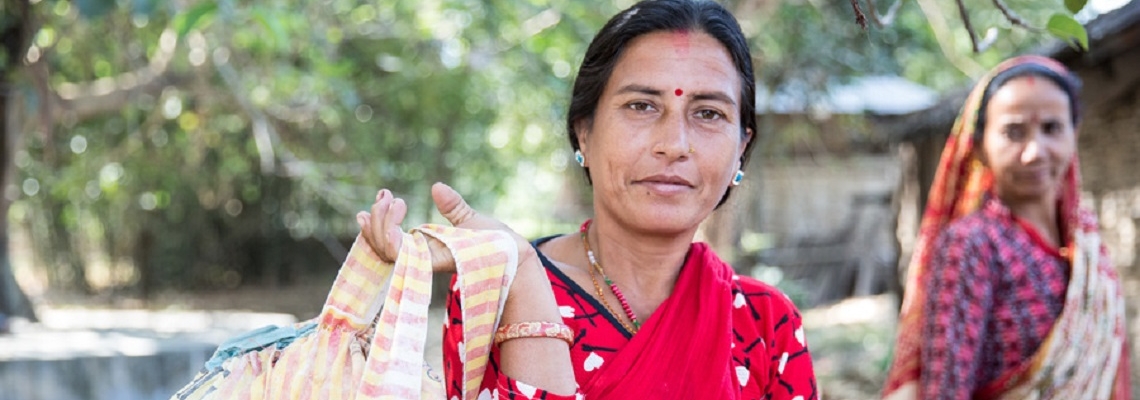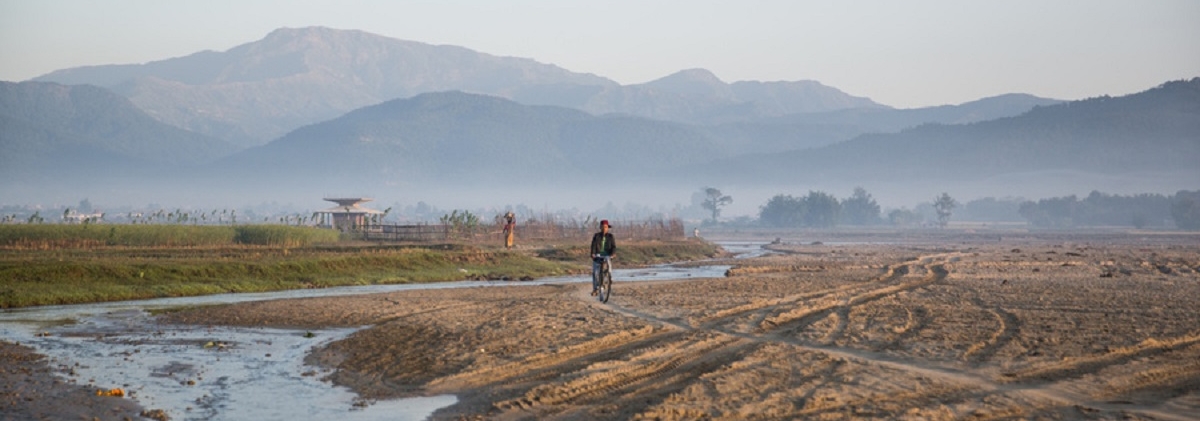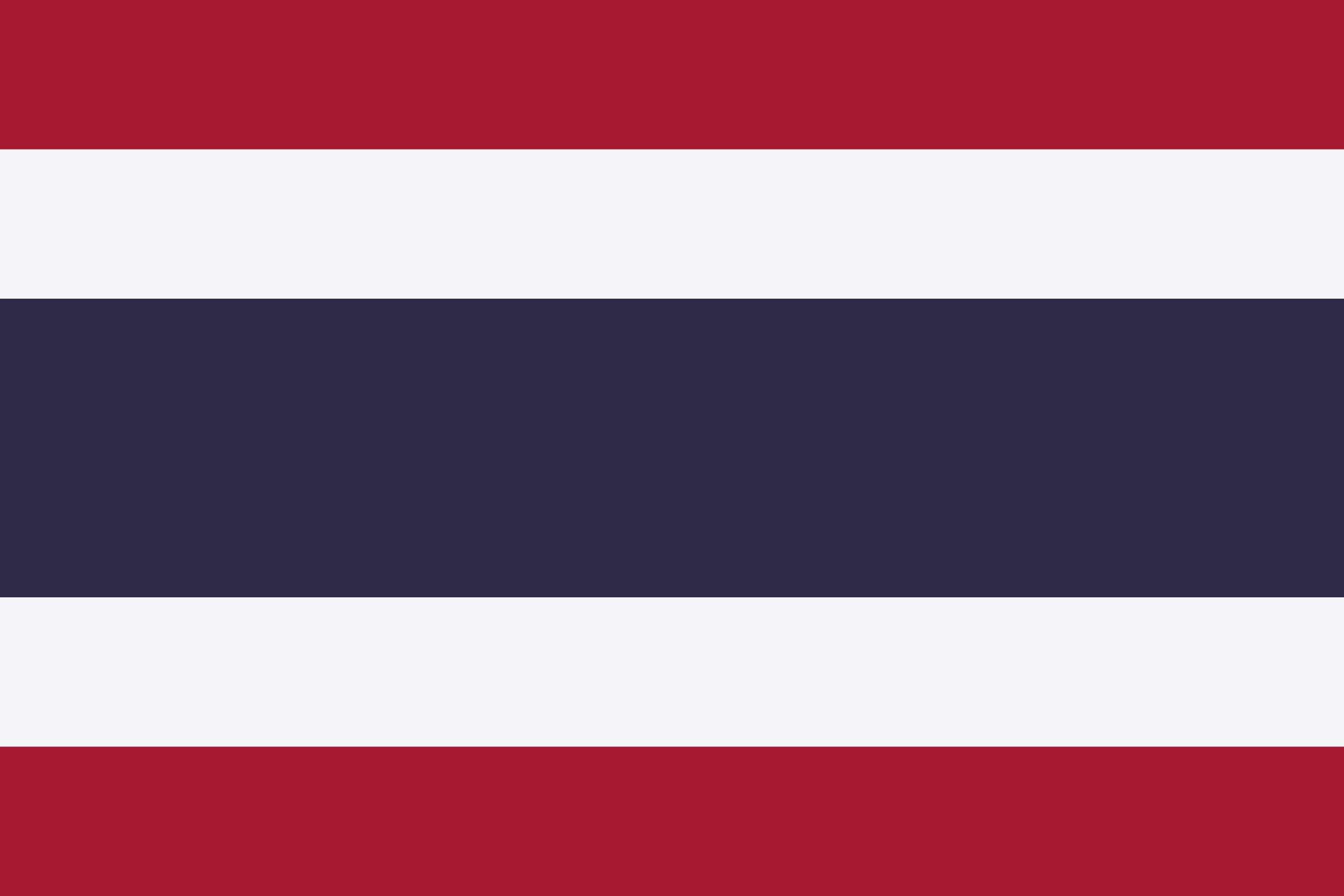Nepal Crisis Response Plan 2020 - 2021
IOM Vision
IOM, in coordination with key stakeholders, seeks to support the strengthening of national, provincial and local governance structures which enable vulnerable communities, including migrants and displaced populations, to be better prepared, protected and have sustainable recovery and increased resilience to crises, climate change, and the impact of COVID-19 pandemic.
Objective
Saving lives and protecting people on the move
|
Direct beneficiaries include stranded migrants in vulnerable situations in major labour destination countries, mainly GCC corridors and Malaysia, returning migrants, internal migrants, IDPs, and front-line risk-management actors from local governments affected by the COVID-19 pandemic, and households of survivors of gross human rights violations including the survivors of conflict-related sexual violence. Indirect beneficiaries including populations and communities most affected due to the COVID-19 pandemic, and communities most affected during the conflict period. |
|
IOM plans to support the IDPs that are displaced as a result of disasters. IOM plans to carry out the following activities:
|
|
The overall objective of IOM’s camp coordination and camp management (CCCM) programming is to improve the living condition and reduce protection risks of disaster displaced communities. In addition, regular consultations will be held with vulnerable groups, and different committees will be set up such as women’s committees and youth’s committees. Access to services will be improved, information on GBV services available and risks will be communicated (in coordination with GBV /Protection specialists) to better understand and address the protection environment and needs. IOM plans carry out the following activities:
|
|
IOM plans to support stranded migrants in vulnerable situations with immediate protection interventions which include temporary accommodation/shelter support, food, psychosocial counselling, MHPSS support, immediate medical assistance, and referral support services in the country of origin (CoO), including humanitarian voluntary return assistance support for purchasing air tickets from key destination countries, including Gulf Cooperation Council (GCC) countries and Malaysia, in order to mitigate protection risks experienced by migrants due to the results of the COVID-19 pandemic. In addition, IOM also plans to support the Government of Nepal in collecting, maintaining, and achieving detailed age and sex-disaggregated data of those stranded, and those who are directly impacted by the global pandemic and repatriated from different countries. IOM plans to carry out the following activities:
|
|
IOM plans to support in providing primary health-care services to crisis-affected populations by ensuring continuity of essential health services, including mental health and psychosocial support and case management, referrals for specialized care through assisted discharge and referral mechanism, and health promotion, risk communication, and community engagement along with COVID-19 related programming adaptations. IOM plans to carry out the following activities:
|
|
IOM together with other UN Agencies plans to be engaged in the implementation of the second National Action Plan (NAP) which is specially focused to provide relief and services to) Conflict-Related Sexual Violence Survivors (CRSV) victims. IOM in past has worked with these survivors and has developed an information booklet, case referral pocketbooks, a CRSV case management protocol and provided training on using these protocols. Beneficiaries will be selected based on the government's NAP for the second phase implementation of UNSCR 1325 and 1820 while ensuring a ‘Do No Harm’ approach and taking due consideration to the issue of secondary traumatization, stigmatization and exposure. IOM plans to carry out the following activities:
|

Objective
Driving solutions to displacement
|
Direct beneficiaries include 200,000 IDPs, returning migrants, and domestic migrants who have been affected by the COVID-19 pandemic and other crises and now face diminished livelihoods and food insecurity, lack of access to and tension over essential services, and mental health repercussions, as well as front-line risk management actors, local governments, and medical personnel engaged as service-providers and as actors mitigating the impact of the pandemic. Indirect beneficiaries include families of migrants whose food security and basic needs are affected by a fall in remittances as a result of the pandemic. |
|
IOM's planned assistance in this area will be guided by the identification and needs of IDPs and support efforts to progressively resolve displacement situations in line with the Progressive Resolution of Displacement Situations (PRDS) framework and the Government of Nepal’s resettlement and relocations policies and guidelines. Wider and stronger partnership with traditional and non-traditional actors including all three tiers of the government, host communities, displaced populations among others will be duly considered in recognition of the complexity of resolving displacement situations. IOM plans to carry out the following activities:
|
|
IOM will provide mental health and psychosocial support (MHPSS) for conflict- and disaster-affected populations at the individual, family, and community level to support them in coping with the situation and contribute towards strengthening social cohesion. Activities are aimed at reducing psychosocial vulnerabilities, promoting community resilience and ownership. Training activities and support will be provided to the affected population and local governments to facilitate the integration of MHPSS into livelihood and development programs at the local levels along with community-based development projects. In addition, IOM will also support to carry out MHPSS assessments, mapping and direct support and referrals. All MHPSS activities will be in line with the IOM Manual on Community-Based Mental Health and Psychosocial Support in Emergencies and Displacement. IOM plans to carry out the following activities:
|
This component seeks to support returnee migrants, their families and communities affected by the COVID-19 pandemic, in particular those who lost their means of livelihoods and are vulnerable, to help build resilience to the negative impacts of, and recover sustainably from health crises, such as COVID-19.
IOM plans to carry out the following activities:
- Implement an integrated approach to support returnee migrants, their families and the communities in which they reside, and local institutions through creating livelihoods opportunities, mental health and psychosocial support services, safeguard food security and access to basic services for individuals not covered by existing social protection schemes.
- Provide livelihoods training, financial literacy and self-employment promotion in the creation of high demand products (e.g. agricultural produces, vegetable and daily consumable items).
- Implement cash-for-work prioritizing lifesaving infrastructure in the immediate term and critical economic infrastructure during the recovery phase.
- Establish and or support small to micro-enterprises to restore and recover lost livelihoods (e.g. to skill match to essential services) linking with financial institutions for soft loan schemes to expand the enterprises to generate employment locally.
- Provide agro-inputs to address interruptions in supply chains and a disrupted planting/harvest season.
- Create digital markets to minimize contacts in-person at the local market to control the spread of the virus.
- Promote social cohesion to community development and engagement through a do no harm approach.
- Conduct a study on reintegration programme, assessment on the impact of COVID-19 to migrants, their families and communities they reside, including on skills matching and their aspirations on reintegration.
- Enhance federal, provincial and local capacities to provide services to mitigate the negative socio-economic impact of the crisis.
Objective
Strengthen preparedness and reduce disaster risk
Direct beneficiaries include actors from local governments, seven provincial governments and security forces, local humanitarian and development actors working in disaster risk management, public health emergencies, and returning migrants affected due to the COVID-19 pandemic. Indirect beneficiaries include the communities, including the families of migrants.
Disaster prevention activities and measures are designed to avoid existing and new disaster risks. Aligned with the Sendai Framework priorities, IOM’s DRR programming works in crisis and post-crisis environments to prevent or reduce displacement associated with disaster and climate risk and strengthen resilience by incorporating “build-back-better” measures in recovery and reconstruction. Specific activity areas include multi-hazard risk assessments, community-based disaster risk management, early warning systems, government capacity-building, risk-informed policies and strategies, risk information systems, environmental protection measures, planned relocation, training, and livelihood diversification.
IOM plans to carry out the following activities:
- Provide capacity development training to governmental or non-governmental staff across the country based on the Disaster Risk Management Localization Manual endorsed by Ministry of Federal Affairs and General Administration (MoFAGA). The manual was developed in collaboration with UN Women and has widely included gender aspects into all the chapters. A dedicated chapter on Gender Equality and Social Inclusion (GESI) and disaster risk management (DRM) has also been built in it. In addition, while rolling out the training women participation will be ensured and mainly women elected leaders such as deputy mayor and vice-chair will be targeted.
|
IOM plans to provide support to improve the ability of key stakeholders - mainly local and provincial governments - to anticipate and effectively respond to the impact of likely hazards including strengthening the capacities of stakeholders to assist migrants in countries in crisis (MICIC). Gender equality will be given due consideration while implementing the activities. IOM plans to carry out the following activities:
|
|
IOM plans to support the Government of Nepal in strengthening the capacity of frontline border officials, and reinforce COVID-19 health compliant SOPs at the points of entry, and support in improving the facilities and infrastructure. Vulnerable populations including returning migrants in isolation temporarily will also be assisted through the distribution of essential non-food items (NFIs) including hygiene kits and menstrual hygiene management kits, on a needs basis. IOM plans to carry out the following activities:
|
|
IOM plans to support activities to strengthen and promote inclusive health systems and to build their capacities to better prevent, detect and respond to complex communicable disease outbreaks and health threats, including the strengthening of surveillance systems and population mobility mapping to foster a migration-sensitive approach to preparedness and risk reduction.
|
Objective
Contribute to an evidence-based and efficient crisis response system
|
As part of the ‘First Line of Defence (FLOD)’ for the COVID-19 response, 2,700 UN Personnel and their eligible dependents, and other persons in need of care referred by the UN, are expected to benefit. As part of the Displacement Tracking, the displacement tracking mechanism report will be shared with the federal, provincial and local governments, along with cluster leads, co-leads, and humanitarian partners for the response activities. Indirect beneficiaries include the communities and populations most affected due to the crisis and COVID-19 pandemic including front-line risk management actors from local governments, development agencies, and the local community organizations directly engaged in providing service in crisis-affected regions. |
|
IOM plans to revise the population tracking tool together with humanitarian actors, the local governments, and cluster leads and co-leads, in line with the federal context and train CCCM partners, humanitarian actors, and development partners to track and monitor displacement across various provinces. DTM will continue to be used for collecting information about the needs and gaps of the displaced population (with sex, age and disability disaggregated data) in the sites that could emerge during the COVID-19 pandemic. IOM plans to carry out the following activities:
|
|
IOM plans to continue providing critical health services to 2,700 UN Personnel and their eligible dependents, and other persons in need of care referred by the UN as part of the ‘First Line of Defence (FLOD)’ for the COVID-19 response. IOM’s Migration Health Assessment Clinics (MHACs) in Nepal (also known as UN Clinic in Kathmandu and Damak) will continue providing services encompassing a range of clinical care services. IOM plans to carry out the following activities:
|
Nepal
The map used here is for illustration purposes only. Names and boundaries do not imply official endorsement or acceptance by IOM.
Figures are as of 31 December 2023. For more details of IOM's operational capacity in country, please see the IOM Capacity section.















